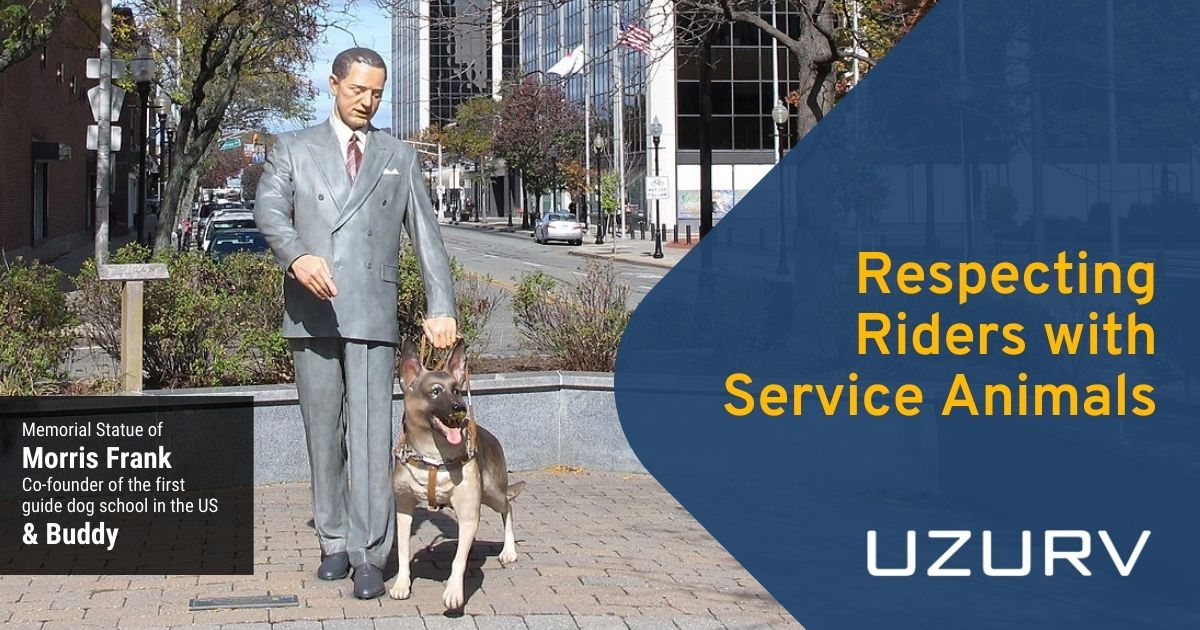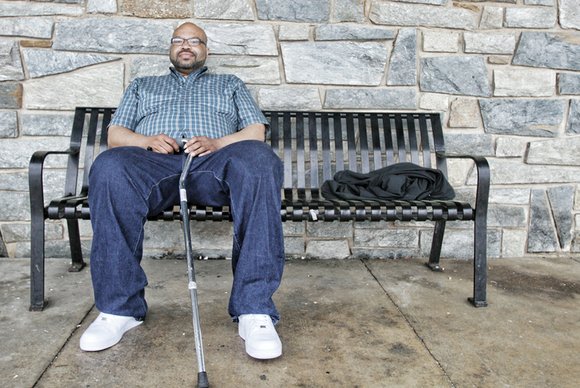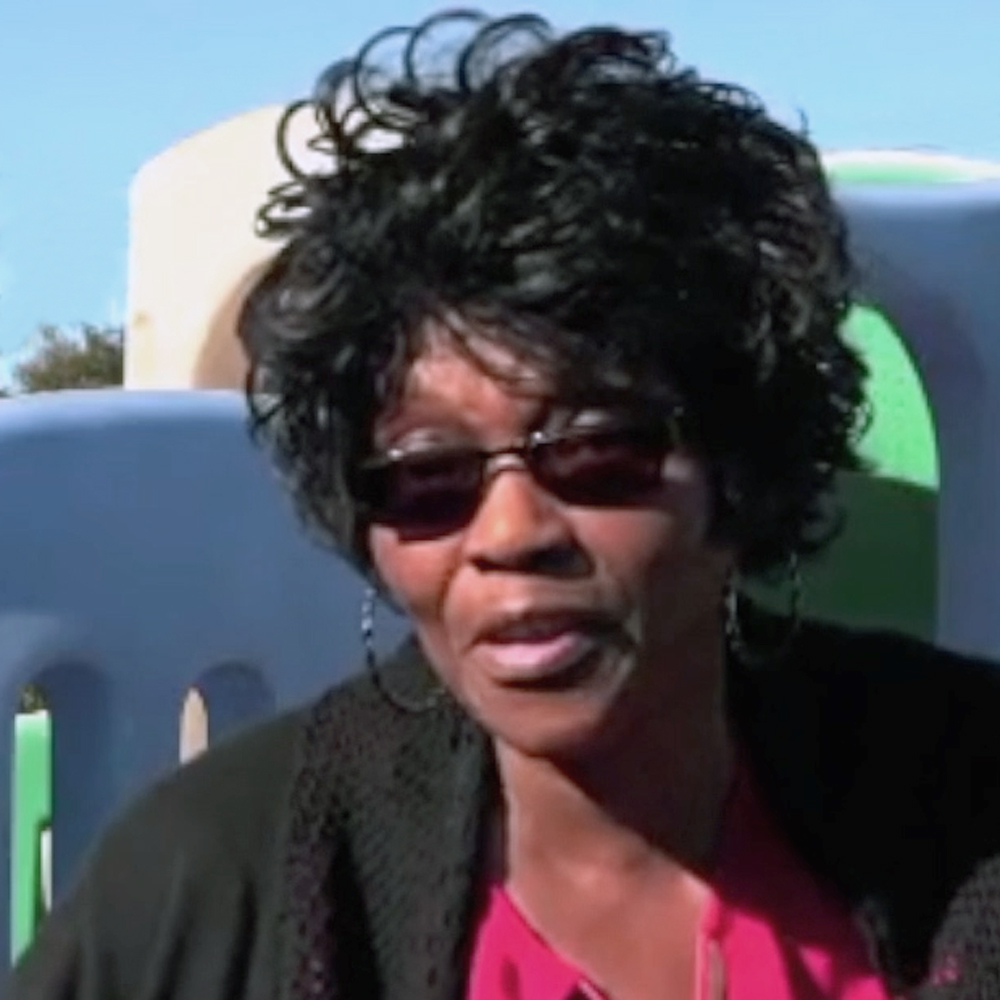For Riders
Respecting Riders with Service Animals

Put simply, these “person-service animal” partnerships are life-changing and powerful.
In one form or another, service animals ![]() have been in existence in America since at least 1929. When Morris Frank
have been in existence in America since at least 1929. When Morris Frank ![]() , one of the founders of The Seeing Eye
, one of the founders of The Seeing Eye ![]() , received his first guide dog, a female German Shepherd he named Buddy. At that time, there were no laws guaranteeing Frank’s right to travel with Buddy. But throughout the intervening decades, all fifty US states enacted laws that defined and protected the rights of first blind and then other people with disabilities to possess and travel with service animals. In 1990, the Americans with Disabilities Act
, received his first guide dog, a female German Shepherd he named Buddy. At that time, there were no laws guaranteeing Frank’s right to travel with Buddy. But throughout the intervening decades, all fifty US states enacted laws that defined and protected the rights of first blind and then other people with disabilities to possess and travel with service animals. In 1990, the Americans with Disabilities Act ![]() established national requirements for how the term “service animal” is defined, the rights that people with disabilities possess for having and traveling with service animals, and the responsibilities that accompany these rights.
established national requirements for how the term “service animal” is defined, the rights that people with disabilities possess for having and traveling with service animals, and the responsibilities that accompany these rights.
According to a recent study by the Pew Research Center ![]() , about 500,000 Americans with disabilities currently use service animals to live with a greater degree of autonomy, dignity, and grace. These amazing animals help their owners to complete daily tasks that might otherwise be impossible—everything from maintaining balance and retrieving dropped articles to opening doors, hearing doorbells, detecting seizures before they happen, and navigating just about any environment—from a quiet country lane to a busy city street or a crowded train station or airport. In return, service animals receive the love and care of their owners. Put simply, these “person-service animal” partnerships are life-changing and powerful.
, about 500,000 Americans with disabilities currently use service animals to live with a greater degree of autonomy, dignity, and grace. These amazing animals help their owners to complete daily tasks that might otherwise be impossible—everything from maintaining balance and retrieving dropped articles to opening doors, hearing doorbells, detecting seizures before they happen, and navigating just about any environment—from a quiet country lane to a busy city street or a crowded train station or airport. In return, service animals receive the love and care of their owners. Put simply, these “person-service animal” partnerships are life-changing and powerful.
Nevertheless, people with disabilities are continuing to report discrimination and denials of service when traveling with their service animals. They speak of business owners, transportation providers, and others who do not understand the requirements of the ADA and the other service animal access laws that are still on the books in all fifty states. They experience fear and rejection from people who believe their animals may be unhealthy, unclean, unsafe, or fraudulent. They are peppered with questions about their disabilities and demands for documentation proving that their animals are legitimate (illegal under the ADA). Worst of all, they share that these denials of access, whether at a store, in a restaurant, or on a vehicle, create a chilling impact on the quality of their lives, on their independence, and on their safety. Some people with disabilities are staying home, simply because they are tired of having their access denied.
At UZURV, we are committed to safe and welcoming transportation for people with disabilities who travel with service animals. We understand and embrace our legal and ethical responsibilities. Driver onboarding at UZURV includes our requirement for service animal access and their understanding of the only two questions drivers can ask when unsure about whether or not an animal is a service animal. Our clear policies and the dedication of our drivers mean that denial of service is practically non-existent with UZURV rides. Any difficulty a rider has starting a trip is often dealt with in real-time and a UZURV driver denying a ride because of a service animal means the immediate and permanent removal from the UZURV platform.
Additionally, we consider it our duty to ensure that every UZURV driver on our platform honors our corporate-level commitment to welcome every rider and every service animal – every time. We invite any rider who has experienced anything less than our best to reach out through our Customer Service Center. Or by sending an email to ridersupport@uzurv.com so that we can address this issue, each and every time it comes up.
What is UZURV? – It’s a Game Changer for Riders

“It’s a game changer… As far as I’m concerned, they’ve hit it out of the park with this program.”
-Roderyck B., UZURV Rider
Home runs are tough to come by for agencies looking to improve the rider experience in the paratransit space. Innovative agencies that have “hit it out of the park” with riders like Roderyck, have scouted out and fielded new solutions that improve paratransit for their customers.
In this second installment of our four-part “What is UZURV?” series, we take a look at the challenges transit agencies face with rider service – and how, with UZURV on the roster, they have been “game changers” for paratransit.
Innovative Agencies Look to Solve The Paratransit Riders’ Three Strikes
The Paratransit Riders’ Three Strikes
Strike 1: Service must often be booked well in advance
Strike 2: Shared Rides
Strike 3: Vehicle Mismatches
Paratransit providers want to provide the best service they can to the communities they serve. Every partner we work with actively pursues solutions to overcome the “three strikes” paratransit riders voice when asked about their experiences:
- Strike 1 – Service must often be booked well in advance. – Typically customers must request their trips at least a day in advance. There may be limited opportunities for same-day service, but in general, customers cannot get a same-day trip: no early departure from work, no last-minute trip to the store for that forgotten gallon of milk, no unplanned burger cravings allowed.
- Strike 2 – Shared rides and extended times in vehicles – Because paratransit is often provided with multi-passenger vans that serve more than one trip at a time, customers are generally required to accept a pick-up time that may be as much as one hour before or after the pick-up time they have requested. Then, once a pick-up time is scheduled, the customer is usually required to be ready and waiting for the vehicle to arrive anywhere within a window of time that could be as long as thirty or forty minutes. Once on board, the customer may share their ride with other customers traveling in the same general direction, or they may ride alone, meaning that the same trip to work or school could be quick today and slow tomorrow. The result is that customers must be able and willing to travel on the provider’s schedule, must spend time waiting for a vehicle when they could be doing other more productive tasks, and they must plan for a trip that might be very short or very long, meaning that the customer might arrive early or very late.
Bottom line: a paratransit rider is often asked to meet the needs of the service rather than the service adapting to meet the needs of the customer.
- Strike 3 – Often vehicles don’t meet the needs of all riders. – Although paratransit systems usually operate fleets of lift or ramp-equipped vans and minivans, only about 20% of passengers need wheelchair-accessible vehicles. As a result, about 80% of riders receive service in vehicles that are not specifically designed for them. Some of these riders live on narrow streets that would be better served by smaller vehicles. Other riders may have difficulty entering and exiting larger vehicles that require the use of steps, a lift, or a ramp. Still other riders may find larger vans less comfortable than smaller sedans or minivans which have been specifically designed with passenger comfort in mind.
UZURV Agencies are Power Hitters!
With UZURV on their team agencies don’t have to sacrifice to advance their paratransit. Here’s how that works:
- UZURV vehicles meet company and contractual requirements, and our drivers are fully vetted, credentialed and trained. Drivers undergo a rigorous national background check, are subject to federally mandated substance abuse testing, and are specifically trained regarding the proper methods for providing appropriate service for older adults and people with disabilities. As a result, riders can expect safe, comfortable, and courteous service every time.
“Every single driver I’ve had with UZURV has gone the extra mile to make sure I’m comfortable and taken care of.”
– Keith S., UZURV Rider
“They’re not treating you like a number. They’re treating me like an individual, not like an old lady. It’s the best program in the world.”
– Shirley B., UZURV Rider

- UZURV is built around and integrates with partner agencies to improve ease of use and accessibility: While every system is different – right now riders can book, pay for, cancel and check on trips by phone – and in the coming months through our Apple and Android compatible mobile app. Our call center is available during all partner agency service hours, and our websites and mobile apps are designed to be fully accessible for people using screen readers, screen magnification, and other types of assistive technology. UZURV’s call center is also able to serve customers speaking English or Spanish as well as those using Text Devices for the Deaf (TTD_).
- UZURV provides flexibility. Although UZURV trips can be scheduled in advance, they can also be requested in as little as one hour before travel – and our rideshare trips are all single rider. This means that riders can either plan ahead or take last-minute trips when they need to. Furthermore, because trips are not shared, travel times are shorter and more predictable. UZURV riders can spend less time planning, less time riding, and more time doing everything else that matters.
- UZURV is committed to safety. Everything UZURV does, from our commitment to use only qualified, well-trained and drug-tested drivers, to our industry-leading vehicle standards, to our call center which is always available, is done to ensure the safety of drivers and passengers. And it shows. UZURV has an enviable safety record of only 0.38 preventable accidents per 100,000 miles operated. And since the onset of the COVID-19 pandemic in March of 2020, none of our clients have reported a single instance of a service-related virus transmission.
“Gail arrived absolutely on time and it was a great trip to the hospital. She was so kind and so friendly and a very safe driver. I thank you so much for your wonderful driver.”
-Norman N., UZURV Rider
So what is the scorecard for paratransit agencies leveraging UZURV? A 98.4% on-time rate, a rider Net Promoter Score® of 92 (that’s considered “world class”) – and all for a savings per-trip (up to 53%) for agencies. Those are home runs for riders any paratransit community can support.
We love to talk about game-changing ideas for paratransit riders – especially if you are a transit agency that wants to knock it outta the park for your paratransit riders. If you are game, reach out to us here: https://uzurv.com/contact/
But what about the drivers? … UZURV is creating communities of compassionate and well-compensated drivers, and we are excited to share that chapter of the “What is UZURV?” story next.
Community Highlight: Greater Richmond Age Wave

As you know, UZURV is very passionate about helping citizens arrange safe, reliable transportation. For citizens with disabilities, we partnered with GRTC in Richmond, Virginia to create the Care On-Demand program. For cancer patients, we partnered with the American Cancer Society to provide cancer patients with transportation to their treatments. These organizations know that UZURV brings an added value to the on demand service–the ability to make a reservation with a driver of your choice.
One group of citizens who could benefit from on-demand transportation is our aging population. Unfortunately the standard model of Uber and Lyft is just not accessible to everyone. Seniors need to know their driver. They need someone who knows them and can help them from the car. Many do not use a smartphone. That’s why, Greater Richmond Age Wave ![]() has engaged us in a conversation with other organizations in the Richmond area to help advocate for legislation that helps our seniors stay mobile and active. Their mission is to “make the Richmond Region a great place for all people to grow older.”
has engaged us in a conversation with other organizations in the Richmond area to help advocate for legislation that helps our seniors stay mobile and active. Their mission is to “make the Richmond Region a great place for all people to grow older.”
Neighborhood Livability Action Team
To help fulfill this mission, Greater Richmond Age Wave has formed the Neighborhood Livability Action Team – a team UZURV is proud to be a part of. The purpose of the initiative is to:
- Increase opportunities for affordable housing, home modification services, and mobility and transportation infrastructure.
- Improve physical infrastructure including accessibility to housing and public transportation.
- Promote public safety and make disaster planning widely accessible.
It’s important for seniors to stay active and not become socially isolated. In fact, studies have shown that senior isolation can increase the risk of mortality, have a negative effect both physically and mentally, increase risk of dementia, and is a major risk factor for depression.
Improved access to transportation is the best way to keep our seniors active. The UZURV solution combines the economics of on demand transportation with the comfort of a personal driver. By giving our clients the ability to select their driver, and make a reservation, UZURV makes the growing resource of on demand transportation accessible allowing more people to stay active, healthy and involved.
